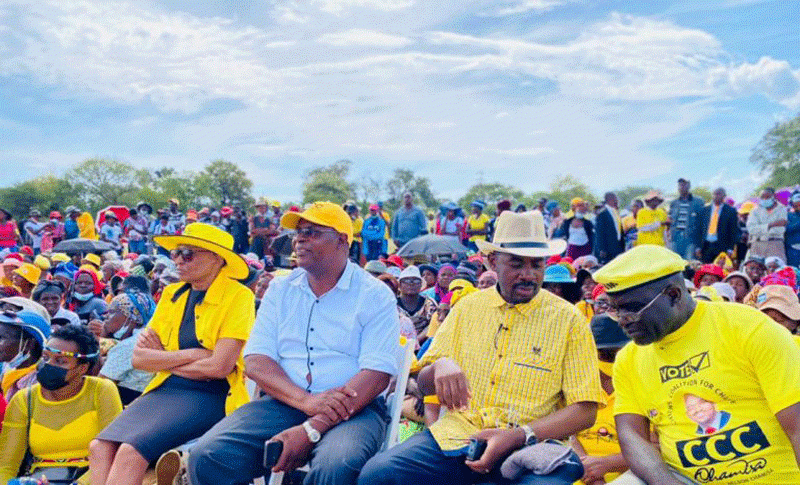
THE latest turmoil within the Citizens Coalition for Change (CCC) signals the potential demise of Zimbabwe’s once-promising opposition party, analysts have said.
When Nelson Chamisa launched the CCC, the party inspired optimism and rekindled hope that it could challenge the ruling Zanu PF party, which has governed since independence in 1980.
However, from its inception, the CCC faced criticism over its lack of structures, a constitution, and an elective congress to ensure leadership accountability.
Its reliance on "strategic ambiguity" rather than a concrete blueprint raised concerns about its ability to dislodge Zanu PF. The cracks widened following Chamisa's loss to President Emmerson Mnangagwa in the controversial 2023 elections, his second defeat after 2018. The polls received adverse reports from the Southern African Development Community and other observer missions, but the CCC's internal issues soon took centre stage.
The emergence of Sengezo Tshabangu, who claimed to be the CCC's secretary-general and recalled several representatives from Parliament and local authorities under dubious circumstances, further destabilised the party.
This triggered by-elections, with Zanu PF consolidating its dominance as the opposition fragmented.
Chamisa’s shock resignation in January 2024, citing Zanu PF’s alleged hijacking of the CCC through Tshabangu, marked another turning point. The opposition leader had already faced criticism for imposing candidates in the 2023 elections, side-lining popular figures like Tendai Biti. Post-resignation, the CCC splintered into factions led by Tshabangu, Welshman Ncube, and Jameson Timba, deepening the divisions.
Political commentator Kudzai Mutisi observed that the internal squabbles spelt doom for the opposition political party.
- News in depth: Fears of violent 2023 polls grow as ED fails to deliver on promises
- Chamisa party defiant after ban
- Letter to my people: Mthuli Ncube experiment has failed
- News in depth: Slain Moreblessing Ali’s family fears cover-up as children are forced into hiding
Keep Reading
"There is nothing pointing to a united opposition in Zimbabwe," he said.
"In fact, the divisions in the opposition are widening with each passing day and 2025 might see more divisions, especially amongst opposition folks in Parliament.”
Tshabangu and Ncube have been locked in a fierce legal fight over the control of the party. As the fight for control of the CCC escalates, Tshabangu's faction met with Mnangagwa at his Precabe farm in Kwekwe and supported plans to postpone elections by two years. This has drawn heavy criticism. Within Zanu PF, there is a group pushing for the extension of Mnangagwa's term to 2030.
Mnangagwa, who is serving his last constitutional term ending in 2028, has said on numerous times that he was not interested in violating the national constitution by extending his term.
Political analyst Reuben Mbofana argued that Tshabangu's actions undermine any claim of opposition credibility, suggesting the faction now aligns with Zanu PF.
“The message being sent by the Tshabangu faction of CCC is that they are now effectively part and parcel of Zanu PF,” he observed.
“They may as well all cross the floor and openly announce their defection to the ruling party and stop hoodwinking Zimbabweans into believing they still have an opposition that represents them.
“The CCC is already dead. There is no other way of saying it. Tshabangu and his group's apparent existence is thanks to the recalls we witnessed last year. However, in all the subsequent by-elections it was clear he was unelectable,” Mbofana added.
With the country grappling with rolling power cuts, rising inflation and spiralling cost of living, he said public trust in the opposition has been eroded. Many citizens perceive the infighting within the CCC as driven by personal gain rather than a commitment to alleviating their struggles.
“The people of Zimbabwe are suffering. With over 70% of the population living below the poverty line whilst nearly half of these are earning less than the international poverty line of US$2,15 a day, there is no way Zimbabweans will continue tolerating the shenanigans of the CCC,” Mbofana said.
“Zimbabweans are thoroughly fed up with watching the ruling elite and their cronies enrich themselves by looting our national resources.
“They are sick and tired of the greedy selfish quislings they are seeing in the so-called opposition, most of whom are actually in bed with Zanu PF and accomplices in Zimbabweans' suffering.”
Political analyst Rejoice Ngwenya pointed out that the fractured CCC was now driven by “material accumulation”.
“CCC will continue grappling for credibility, money and relevance, possibly divided on the issue of #ED2030. I call it the “Precabe Farm phenomenon opposition”– compliant, thirsty for money and totally clueless,” he said.
“The 'strength' of opposition lies in two things: The ability of a completely brand-new person to unite everyone around one cause. And the ability of the “old guard” — here I mean Chamisa, Biti, Ncube and (Douglas) Mwonzora to unite.”
Following the departure of Chamisa from CCC, Biti, Ncube and Lynette Kairenyi Kore assumed the presidency of the party on a rotational basis. However, Biti also walked away from the squabble-ridden CCC, further weakening the political party. In the aftermath of Chamisa’s resignation, the remaining party leaders have also fought over funds released under the Political Parties Finance Act.











